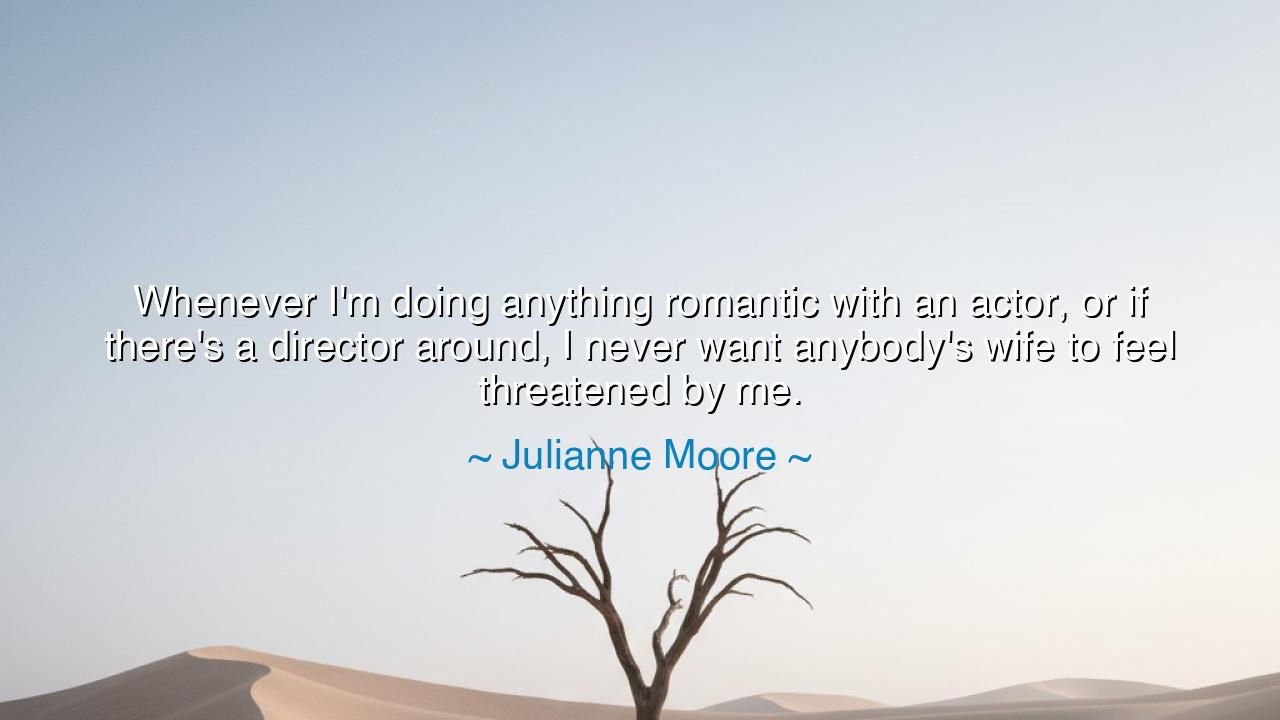
Whenever I'm doing anything romantic with an actor, or if there's
Whenever I'm doing anything romantic with an actor, or if there's a director around, I never want anybody's wife to feel threatened by me.






"Whenever I'm doing anything romantic with an actor, or if there's a director around, I never want anybody's wife to feel threatened by me." These words, spoken by Julianne Moore, echo with wisdom and caution, revealing an understanding of the delicate balance between professionalism and personal boundaries. Moore’s statement addresses the complexity of romantic portrayals in the acting world and the vulnerability that comes with intimacy on screen. At its core, this quote reflects the importance of maintaining respect and integrity within relationships, particularly when navigating the often-complicated dynamics of working in an industry where the lines between performance and reality can become blurred.
The ancient Greeks understood the complexities of romance and relationships through their stories, where gods and mortals alike often found themselves entangled in love, desire, and jealousy. Take, for instance, the tragic tale of Helen of Troy and Menelaus. Helen’s beauty and the romantic allure she held caused a rift between nations and ignited the Trojan War. Though Helen did not intend to cause harm to her husband, Menelaus, the jealousy and conflict that arose from her romantic entanglements brought about immense suffering. The ancient world was full of such stories where romance and intimacy became battlegrounds, both for individuals and for societies. In this way, Moore's commitment to ensuring that no one feels threatened by her in her professional life reflects an awareness of the emotional weight that romantic roles can carry.
Julianne Moore, like many of the great artists throughout history, recognizes the responsibility that comes with portraying romance and intimacy on screen. Just as Shakespeare’s actors, even in their theatrical portrayals of love, had to navigate complex relationships with their audience and with one another, Moore is keenly aware of the real emotions that can be triggered by on-screen intimacy. The Greeks used theater as a mirror for society, showing that the romantic ideal could be as destructive as it was beautiful. Similarly, Moore's awareness of her role in creating that illusion without encroaching on real-life relationships demonstrates a profound respect for the complexity of human emotions and social boundaries.
Think of the ancient myth of Pygmalion, the sculptor who carved a statue so perfect in his eyes that he fell in love with it. His devotion was so intense that the goddess Aphrodite, moved by his love, brought the statue to life. While Pygmalion’s love was entirely directed toward his creation, the story reveals the thin line between art and real life, between idealization and obsession. Moore’s desire to keep the romantic connection on-screen separate from real-life relationships mirrors this ancient understanding: that the emotions stirred by romantic portrayals must be handled carefully, lest they create tension or harm outside the crafted environment.
Moreover, Moore’s words also reflect a broader principle of integrity and honor. In the ancient world, chivalry was often upheld as the code of honor that guided relationships, particularly between men and women. The knights of the Middle Ages, bound by their code, were expected to demonstrate respect not only for their beloved but also for her honor and family. Similarly, Moore’s sense of respect for the relationships around her reveals a modern-day application of this ancient ideal. She is not only acknowledging her own responsibility but also respecting the emotional realities of the people she interacts with. By taking care to ensure that no one feels threatened, Moore is upholding a moral code of respect and kindness that extends beyond her professional life.
The lesson we can take from Julianne Moore’s reflection is one of empathy and responsibility. In all aspects of our lives, especially in relationships—whether professional or personal—it is essential to be aware of the impact our actions can have on others. The ancient world, with its complex tales of love and betrayal, offers us timeless wisdom about the power of respecting boundaries and honoring the connections we have with those around us. Just as Moore navigates the complex space between acting and authenticity, we too must find ways to honor the relationships in our lives by being mindful of our actions, words, and intentions.
In your own journey, whether in romantic relationships, friendships, or professional engagements, consider the impact your actions may have on those around you. Practice integrity by recognizing that love, affection, and connection should never be used as tools to manipulate or harm others. Let your relationships be built on a foundation of mutual respect, where each person’s emotions are considered with care. As Julianne Moore wisely teaches, being romantic is not about making grand gestures but about ensuring that your actions align with the well-being and emotional safety of everyone involved.






AAdministratorAdministrator
Welcome, honored guests. Please leave a comment, we will respond soon